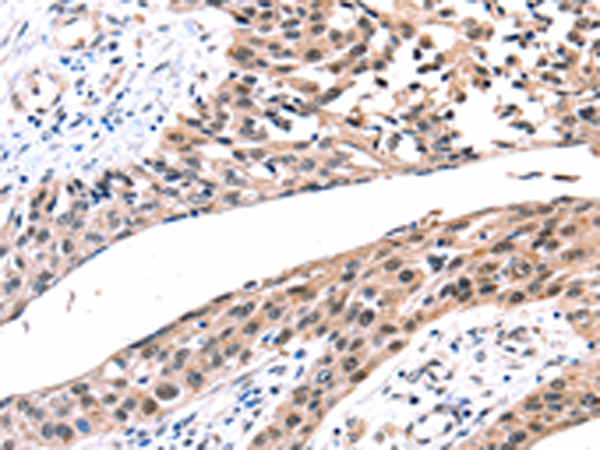
| WB | 咨询技术 | Human,Mouse,Rat |
| IF | 咨询技术 | Human,Mouse,Rat |
| IHC | 1/100-1/300 | Human,Mouse,Rat |
| ICC | 技术咨询 | Human,Mouse,Rat |
| FCM | 咨询技术 | Human,Mouse,Rat |
| Elisa | 1/1000-1/10000 | Human,Mouse,Rat |
| Aliases | HID, KID, PPK, CX26, DFNA3, DFNB1, NSRD1, DFNA3A, DFNB1A |
| Host/Isotype | Rabbit IgG |
| Antibody Type | Primary antibody |
| Storage | Store at 4°C short term. Aliquot and store at -20°C long term. Avoid freeze/thaw cycles. |
| Species Reactivity | Human, Rat |
| Immunogen | Synthetic peptide of human GJB2 |
| Formulation | Purified antibody in PBS with 0.05% sodium azide and 50% glycerol. |
+ +
以下是关于GJB2抗体的3篇参考文献示例(内容为模拟概括,建议通过学术数据库验证具体信息):
1. **文献名称**:*GJB2 (Connexin 26) antibody localization in the mammalian cochlea*
**作者**:Kikuchi T. et al.
**摘要**:研究利用抗GJB2抗体通过免疫组化技术,揭示了连接蛋白26(Cx26)在小鼠耳蜗支持细胞和基底膜中的特异性分布,证实其在内耳细胞间信号传递中的关键作用。
2. **文献名称**:*Mutation analysis of GJB2 using monoclonal antibodies in hereditary hearing loss*
**作者**:Ahmad N. et al.
**摘要**:通过开发高特异性GJB2单克隆抗体,结合Western blot和免疫荧光技术,分析了遗传性耳聋患者中GJB2突变导致的蛋白表达异常,为基因诊断提供实验依据。
3. **文献名称**:*Antibody-based detection of GJB2 expression in human epidermal tissues*
**作者**:Xu J. et al.
**摘要**:研究利用兔源多克隆抗体检测GJB2在人类皮肤组织中的表达,发现其在表皮细胞间隙连接中的广泛分布,并探讨其与皮肤疾病(如掌跖角化症)的潜在关联。
**提示**:实际文献需通过PubMed、Web of Science等平台以“GJB2 antibody”或“Connexin 26 antibody”为关键词检索。部分研究可能侧重基因突变而非抗体开发,建议筛选时关注实验方法学部分。
GJB2 antibodies target the gap junction beta-2 protein, encoded by the GJB2 gene, which plays a critical role in forming connexin channels. These channels facilitate intercellular communication by allowing the exchange of ions, metabolites, and signaling molecules. GJB2 is particularly vital in the inner ear, where it maintains potassium homeostasis necessary for auditory function, and in the skin, where it supports epidermal integrity. Mutations in GJB2 are the most common genetic cause of nonsyndromic hearing loss (NSHL), accounting for up to 50% of cases globally. They are also linked to skin disorders like keratoderma.
GJB2 antibodies are essential tools in research and diagnostics. They help detect protein expression in tissues, study subcellular localization, and assess functional consequences of pathogenic mutations (e.g., impaired channel assembly). In clinical settings, these antibodies may aid in confirming GJB2-related pathologies when genetic testing is inconclusive or to correlate genotype-phenotype relationships. Additionally, they contribute to exploring therapeutic strategies, such as gene therapy or pharmacologic interventions to restore channel function. However, their utility in routine diagnostics remains limited compared to DNA sequencing, which is the gold standard for identifying GJB2 mutations. Research continues to elucidate the structural and regulatory mechanisms of GJB2. aiming to develop targeted treatments for hearing loss and dermatologic conditions.
×